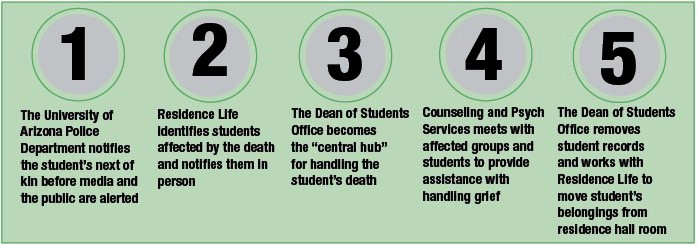When Michael Anderson, 19, fell to his death on the roof of Colonia de la Paz Residence Hall in the early morning hours of April 4 , news vans gathered around the site, UA community members took to social media to react and the University of Arizona Police Department launched its investigation.
Meanwhile, the UA responded to the death of one of its students.
Reactions can vary greatly depending on the circumstances surrounding the student death, but the UA employs similar protocol for each.
A death on campus is the worst case scenario, according to Kendal Washington White, assistant vice president for Student Affairs and dean of students. The Dean of Students Office becomes the “central hub” for handling the aftermath of a student’s death.
One of the first things the university does is notify those who may be affected. For the most part, UAPD handles notification of family and next of kin for an on-campus death, according to White.
Anderson was residing in Colonia de la Paz at the time of his death, so the Dean of Students Office coordinated with Residence Life to respond to the needs of that residence hall community.
Nick Sweeton, senior director for residential education for Residence Life, said that typically when Residence Life becomes aware of the death of a resident, members meet with the leaders of the student’s residence hall to coordinate their response.
Residence Life tries to notify students who may be most impacted by the death: the student’s roommate, residents on the same floor and any students identified as close friends, Sweeton said. While Residence Life tries to notify these people in person, it is not always possible to be the first to give them the news.
“Sometimes the way that news travels is faster than we’re able to travel or we’re able to find everybody we know who’s been the most deeply impacted,” Sweeton said.
Once in-person notifications are completed, Residence Life will typically send out a campus community-wide email notifying other residents of the death, he added, which the office did after Anderson’s death. The Dean of Students Office also notifies the head of the department that the student was enrolled in, White said.
White said that while the UA hasn’t done so in the past, it will begin notifying faculty members as well.
The Dean of Students Office then works to close the student’s records from the UA, White added.
“We help the family to not have to worry about closing out the student’s records, withdrawing them from classes and packing up the student’s items if they’re in a residence hall,” White said.
Students who have died are withdrawn from their classes through the Office of the Registrar with a W on their transcript, White said.
The Dean of Students Office also identifies communities at the UA that have been affected by the student’s death and works with them, White said. That could mean a Greek organization or a club the student belonged to, or their residence hall if they lived on campus.
“We try to take a holistic approach to address all communities that are impacted by a student’s death,” White said.
Counseling and Psych Services also provides resources to friends or communities affected by the student’s death.
CAPS employs about 20 counseling staff including psychologists, social workers and licensed mental health counselors, according to Marian Binder, director of CAPS.
“The nature of the event dictates exactly what we put together,” Binder said.
CAPS goes out on campus to meet with groups that may have been affected. In Anderson’s case, he was a member of Phi Gamma Delta fraternity and a resident of Colonia de la Paz. Binder said that CAPS works closely with the Dean of Students Office and Residence Life in responding to an on-campus death.
“We try to identify as many fronts as possible and go out and talk to them about grief, and reactions to getting news like this, and the multiple levels of reaction people can have,” Binder said.
Oftentimes in the immediate aftermath of an event as shocking as the death of a loved one, people don’t know what they feel, Binder said, so CAPS assists people if they need help coping.
“A lot of times people think when something happens they should only be upset if they were really close to the person, or they should only be upset for a certain length of time and then they should get over it,” Binder said. “But grief is very complex.”
CAPS provides a triage service when the center is open, which allows students to visit a counselor the same day they feel like they need to talk to somebody, Binder said. Follow-up appointments can be made if the student feels like they need more assistance. Those affected may continue to experience grief even well after the death of a loved one, and CAPS will continue to provide services, Binder said.
No two people react the same way to death, and close friends and roommates of the dead student are often torn in many different directions in their reactions, Binder said.
Residence Life works closely with the roommate of a student who died, according to Sweeton.
“Most of the time, they like to switch rooms, so we will accommodate a room move for them,” Sweeton said.
The Dean of Students Office also works with roommates to provide the help they need, including telling their professors that the student has recently experienced a tragedy, White said.
“The Dean of Students Office cannot force faculty to provide accommodations,” White said. “We just ask them to give the student consideration.”
White said that a student’s death impacts not only the campus community, but also those who work with affected community and family members.
“Whenever a student passes away, it’s always sad for the campus community,” White said.
The original version of this article incorrectly stated that CAPS staff assists psychologists, social workers and licensed mental health counselors. CAPS staff includes psychologists, social workers and licensed mental health counselors. The Daily Wildcat regrets the error.









